德媒称,胡锦涛访港时的壁垒森严颇有象征意义,香港人在回归中国15年后对北京很不满,表明香港与内地的融合事与愿违。
《日报》7月1日认为,"香港这座700万人的大都市星期日经历了将近50万人参与的15年来的最大游行。""中国国家元首在自己国家碰到这么多的抗议还是第一次。"
该报写道,"这个前英国殖民地回归中华人民共和国15年后,香港人很不满。自由党前主席李鹏飞在《南华早报》写道,过去15年的政策促使香港成为世界上贫富悬殊最大的城市。"
该报称,"在一项民意调查中,87%被询问的香港记者承认,获得信息变得困难,报道时受到阻挠。较之2007年的一个类似的民意调查增加了30%。"
《新苏黎世报》7月1日评论说,"……胡锦涛如果真像他星期五抵达时所说的那样,打算在香港走走、了解居民的生活和愿望,先决条件就不具备。他在两天半的访问中,主要是在屏障内活动。尽管如此还是小有摩擦,这个措施传达的象征意义颇为意味深长。
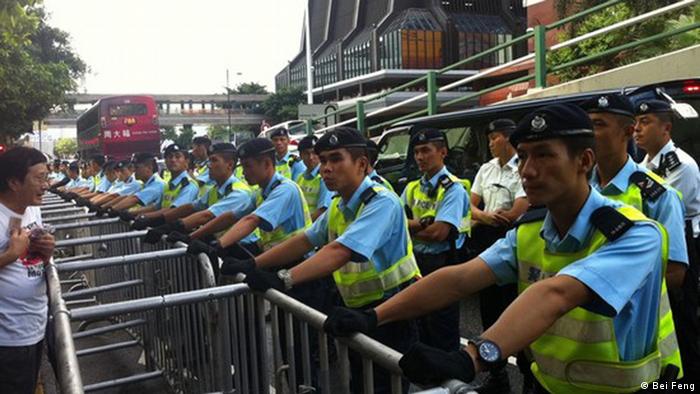 "……中国官媒赞扬融合的进步,甚至赞扬香港的法制、反腐败斗争和民主发展,由于这些成就,香港比起中国其它地方来确实鹤立鸡群。胡的访问及其伴随现象表
明,不是融合有了进步,而是香港与被称作'大陆'的中国其它地方之间有鸿沟。在压制性的中国政治制度中,香港是肉中刺,但对很多中国人来说也是一个榜样。
在他们看来,实际效果显而易见,尤其在食品安全上。数百万中国游客奔赴香港特别为了采购,因为可以更放心地不会买到假冒伪劣产品。"
"……中国官媒赞扬融合的进步,甚至赞扬香港的法制、反腐败斗争和民主发展,由于这些成就,香港比起中国其它地方来确实鹤立鸡群。胡的访问及其伴随现象表
明,不是融合有了进步,而是香港与被称作'大陆'的中国其它地方之间有鸿沟。在压制性的中国政治制度中,香港是肉中刺,但对很多中国人来说也是一个榜样。
在他们看来,实际效果显而易见,尤其在食品安全上。数百万中国游客奔赴香港特别为了采购,因为可以更放心地不会买到假冒伪劣产品。"
"对北京的不满大增"
该报写道:"对北京的不满最近几个月在增强,6月4日对1989年被镇压的天安门广场大学生运动的纪念活动规模之大是多年来不曾有过的。中国异议人士李旺 阳离奇死亡后不久,尤其从香港发出了要求解释的呼声。担心失去自由权利以及担心香港在政治上更顺服北京,表现在周末对胡锦涛的冷淡欢迎上。让许多香港人不 快的是,胡在香港的第一站是解放军军营,解放军在必要时保障北京的权力,然而从不允许公开露面。他下榻宾馆前面的高高屏障、互联网上的公开批评、讲话时夹 杂的呼喊以及参观线路中的粗鲁防护--警察对抗议者动用胡椒喷雾器,与胡在大陆的经历都恰恰相反。然而,就连大陆的网民也嘲笑胡对人民的逃避。但是,很多 香港人的不满也针对香港自身的政策。新港首梁振英是带着严重的"先天不足"上任的,……因其可能太亲近北京、民粹主义同时又独断专行的风格以及新揭露出来 的丑闻,无法摆脱人们的不信任。他在上任之前就曾粗暴对待过立法会,记者发现近年来更难获得信息,自我审查在加剧。
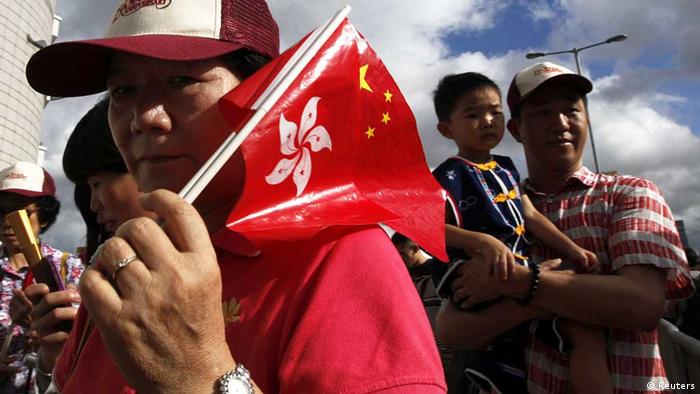 "同时对新港首期待太高,因为民众的不满不仅限于民主进程不完善。社会紧张近年来大增,贫富悬殊巨大,房地产价格如此之高,以至于许多人感到住房过于昂贵。梁许诺加以纠正,然而他也被香港这个部分地寡头政治体系所束缚。
"同时对新港首期待太高,因为民众的不满不仅限于民主进程不完善。社会紧张近年来大增,贫富悬殊巨大,房地产价格如此之高,以至于许多人感到住房过于昂贵。梁许诺加以纠正,然而他也被香港这个部分地寡头政治体系所束缚。
"上半年港人的不满日益针对来自中国内地的游客,胡呼吁加强融合和'和谐社会'这个他所提倡的口号,而很多香港人希望更多的民主权利、尤其是直选行政长官,这种急躁以及对社会条件的不满表明事与愿违。"
编译:林泉
责编:达扬
该报写道,"这个前英国殖民地回归中华人民共和国15年后,香港人很不满。自由党前主席李鹏飞在《南华早报》写道,过去15年的政策促使香港成为世界上贫富悬殊最大的城市。"
该报称,"在一项民意调查中,87%被询问的香港记者承认,获得信息变得困难,报道时受到阻挠。较之2007年的一个类似的民意调查增加了30%。"
《新苏黎世报》7月1日评论说,"……胡锦涛如果真像他星期五抵达时所说的那样,打算在香港走走、了解居民的生活和愿望,先决条件就不具备。他在两天半的访问中,主要是在屏障内活动。尽管如此还是小有摩擦,这个措施传达的象征意义颇为意味深长。

"对北京的不满大增"
该报写道:"对北京的不满最近几个月在增强,6月4日对1989年被镇压的天安门广场大学生运动的纪念活动规模之大是多年来不曾有过的。中国异议人士李旺 阳离奇死亡后不久,尤其从香港发出了要求解释的呼声。担心失去自由权利以及担心香港在政治上更顺服北京,表现在周末对胡锦涛的冷淡欢迎上。让许多香港人不 快的是,胡在香港的第一站是解放军军营,解放军在必要时保障北京的权力,然而从不允许公开露面。他下榻宾馆前面的高高屏障、互联网上的公开批评、讲话时夹 杂的呼喊以及参观线路中的粗鲁防护--警察对抗议者动用胡椒喷雾器,与胡在大陆的经历都恰恰相反。然而,就连大陆的网民也嘲笑胡对人民的逃避。但是,很多 香港人的不满也针对香港自身的政策。新港首梁振英是带着严重的"先天不足"上任的,……因其可能太亲近北京、民粹主义同时又独断专行的风格以及新揭露出来 的丑闻,无法摆脱人们的不信任。他在上任之前就曾粗暴对待过立法会,记者发现近年来更难获得信息,自我审查在加剧。

"上半年港人的不满日益针对来自中国内地的游客,胡呼吁加强融合和'和谐社会'这个他所提倡的口号,而很多香港人希望更多的民主权利、尤其是直选行政长官,这种急躁以及对社会条件的不满表明事与愿违。"
编译:林泉
责编:达扬
多方統計港七一遊行約10萬人 【10:35】
〔中央社〕多方權威統計顯示,由民主派發起的香港「7.1」遊行,人數約10萬,未如主辦方所說的40萬人,但已是歷來人數較多的一次。
民間人權陣線昨天一如往昔,在香港紀念主權移交之際,發起大型遊行,對特別行政區政府和北京當局表達各種不滿和訴求,包括徹查湖南省民運人士李旺陽的死因。
民陣事後公布,遊行人數有40萬,是他們自2003年起舉辦「7.1」遊行以來的第二高。但多方權威統計指出,人數沒有那麼多。
警方指出,遊行人數最高峰時只有6萬3000人;港大民意研究計畫在人龍途經的灣仔派人統計,只有6萬8000人,即使有些人沒有經過這裡,估計總人數也只有9萬8000至11萬2000人。
香港大學社會工作及社會行政學系教授葉兆輝說,派了9名學生點算人數,較接近遊行起點的地方有5萬人,接近終點時有6萬9000人,加上無法點算的,估計總人數為7至9萬。
香港每年有兩大遊行集會,備受各方甚至北京方面關注,一是紀念「六四」的燭光晚會,二是「7.1」遊行,因為它們已成為衡量港人對特區政府及北京不滿程度的晴雨表。
因此,人數的多寡,往往對特區政府的施政及北京的統戰工作構成無形壓力,尤其是香港行政長官梁振英剛於昨天上任。
事實上,部分立場較針對梁振英的報章,今天就在頭版只引用民陣所公布的數字指出,「40萬人喊梁振英下台」,「40萬人上街,梁振英變跛腳鴨」。
民陣發起「7.1」遊行以來,除了2003年有50萬人外,以後各年的人數約只有2至3萬人(警方數字),但去年及今年的人數則大幅攀升。
有分析家認為,去年和今年人數攀升,顯示民眾因諸多問題尤其是政治事件,對特區政府和北京的不滿程度有所上升。
日經中文網
後藤卓彥:香港迎來回歸15週年。和回歸前的“香港衰退論”相反,香港卻出乎意料地實現了高增長。而支撐這一現實的因素是來自中央的經濟扶持政策,以及香
港與中國內地的經濟一體化戰略。但在中國內地超高增長已迎來轉捩點的現在,一直通過“變形”發展起來的香港能否再次找到新增長點?民間人權陣線昨天一如往昔,在香港紀念主權移交之際,發起大型遊行,對特別行政區政府和北京當局表達各種不滿和訴求,包括徹查湖南省民運人士李旺陽的死因。
民陣事後公布,遊行人數有40萬,是他們自2003年起舉辦「7.1」遊行以來的第二高。但多方權威統計指出,人數沒有那麼多。
警方指出,遊行人數最高峰時只有6萬3000人;港大民意研究計畫在人龍途經的灣仔派人統計,只有6萬8000人,即使有些人沒有經過這裡,估計總人數也只有9萬8000至11萬2000人。
香港大學社會工作及社會行政學系教授葉兆輝說,派了9名學生點算人數,較接近遊行起點的地方有5萬人,接近終點時有6萬9000人,加上無法點算的,估計總人數為7至9萬。
香港每年有兩大遊行集會,備受各方甚至北京方面關注,一是紀念「六四」的燭光晚會,二是「7.1」遊行,因為它們已成為衡量港人對特區政府及北京不滿程度的晴雨表。
因此,人數的多寡,往往對特區政府的施政及北京的統戰工作構成無形壓力,尤其是香港行政長官梁振英剛於昨天上任。
事實上,部分立場較針對梁振英的報章,今天就在頭版只引用民陣所公布的數字指出,「40萬人喊梁振英下台」,「40萬人上街,梁振英變跛腳鴨」。
民陣發起「7.1」遊行以來,除了2003年有50萬人外,以後各年的人數約只有2至3萬人(警方數字),但去年及今年的人數則大幅攀升。
有分析家認為,去年和今年人數攀升,顯示民眾因諸多問題尤其是政治事件,對特區政府和北京的不滿程度有所上升。
 |
| 圖為6月29日抵達香港的中國國家主席胡錦濤在機場 |
香港之所以保持了如此高的經濟增長率,是因為成功利用了中國內地經濟的活力。中國大型國有企業上市之際第一選擇就是香港,這雖然在回歸前就成了趨勢,而香 港回歸後中國內地企業中在全球IPO中融資金額也首屈一指的大盤股上市案例接連不斷,因此香港也獲利豐厚。
在香港面臨危機之際,中央政府先後出臺救助香港經濟的舉措。在非典流行,經濟受到打擊的2003年,中央政府為了在貿易關稅和投資方面給香港提供優惠,與 香港特別行政區簽署了《內地與香港關於建立更緊密經貿關係的安排》(CEPA)。此外,還啟動了中國內地赴香港個人旅遊,香港酒店業和流通業由於受中國內 地遊客購物等消費的拉動,恢復了生機。在雷曼危機後,香港經濟增長率在2010年為7.3%,2011年為5.0%,實現了“V字型”復蘇,而這也正是因 為有了中國政府推出的4萬億元刺激經濟計劃以及隨之而來的中國內地經濟高增長才取得的成就。
但令人擔憂的因素也在不斷增加。其中之一是房地產價格的暴漲。據《香港經濟日報》旗下的調查公司統計顯示,香港的高級公寓價格在2003年平均每平方英尺 (約0.09平方米)約為5000港幣,而到2011年已經暴漲至約15000港幣。有分析認為中國內地富裕階層的投機資金推高了香港房地產行情,這可以 說是單純依靠中國內地的高增長的副產物。進入今年以來雖然有小幅調整,但香港的房地產價格仍然是全球最高水準,從而有可能降低香港作為商業中心的競爭力。
美國保守派智庫美國傳統基金會(Heritage Foundation)與美國《華爾街日報》聯合實施的“經濟自由度指數”調查顯示,香港已經連續18年高居世界首位,香港法制方面的條件很有競爭力。但 是,這方面也發生了令人擔憂的事件。今年3月,香港反貪污機構廉政公署拘捕房地產巨頭新鴻基地產掌門人郭氏兄弟和香港政府前第二號人物許仕仁。
香港由於有強有力的廉政公署的存在,在亞洲作為屈指可數的清廉商業城市聞名於世。如此顯赫的大人物遭到拘捕,不禁讓人大吃一驚。遭逮捕後,新鴻基經營者對 指控進行了全盤否定,真相至今仍未浮出水面。房地產行業對香港商業成本具有巨大影響,同時又是香港最大產業,如果房地產開發商與香港政府之間存在勾結關 係,將會削弱香港經濟的活力。 將紡織和玩具等勞動密集型生產過程從香港轉移到廣東省的“前店後廠”模式迎來拐點是毫無疑問的。在雷曼危機以後廣東省上述行業的工廠相繼出現了倒閉。委託 這些工廠進行生產的企業很多都是香港企業。隨著中國內地經濟逐步放緩,香港今年1-3月的經濟增長率已經放緩至3%左右。
 |
| 圖為香港景色 |
不過,如果中國國內的人民幣交易今後變得更加自由,香港的離岸人民幣交易就只能是起到過渡作用。廣東也在汪洋的領導下摸索著推進結構性改革,在廣東省內的企業中,也出現了將工廠遷往內陸地區的趨勢。以往曾經優勢互補的夥伴今後有可能成為競爭對手。
“前店後廠”模式對於香港而言,是在“借來的時間、借來的土地”的基礎上啟動的經營模式。因為不知未來如何,因此才將快速收回投資作為最優先課題,進而選擇了以最小限度設備投資即可啟動的紡織和玩具等勞動密集型產業,並將生產基地選在了廣東省。
現在既然已經無需再考慮“借來的時間、借來的土地”這一問題,香港就應該以長期戰略性眼光考慮問題,不再事事仰仗中國內地的提攜,而要確立依靠自身努力的增長模式。香港政府正在力爭吸引R&D(企業研究與開發)部門等進駐香港,但截至目前仍未取得明顯效果。
不過也出現了值得關注的動態。日產汽車於今年4月將高檔車品牌“英菲尼迪”全球總部機構轉移到香港就是其中之一例。該公司將在香港製定附加值較高的高檔車 商品策劃、行銷以及銷售等戰略。瞄準中國乃至世界市場,將工廠的戰略和策劃中樞部門放在香港,這是一種全新的嘗試。日產副社長安迪•帕爾默(Andy Palmer)在談到選擇香港的理由時表示,香港是亞洲增長市場的中心,“是無可挑剔的地點”。
香港作為海外與中國內地之間的單純的中繼貿易港獲得了發展,自20世紀60年代後半期以來,發展成為了以紡織業為中心的加工貿易基地,80年代則轉變為金 融服務中心。曾經擔任《香港基本法》起草委員會副主任等職務的實業家安子介(已故)將這種情況稱為“變形蟲經濟”。在回歸15週年之際,香港能否再次轉換 身姿?
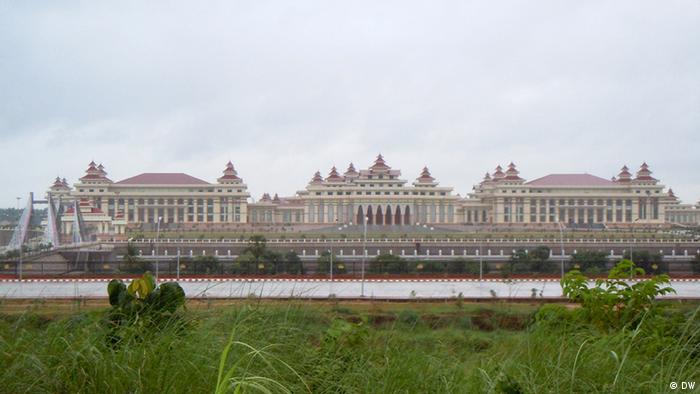
Myanmar's democracy icon Aung San Suu Kyi has been told off by
the country's electoral authorities for using the name 'Burma' to refer
to the country. So, what really is in a name anyway?
In its rebuke, Myanmar's electoral commission began by referring to Suu Kyi by using the honorific prefix "Daw."
"Daw Aung San Suu Kyi called Myanmar 'Burma' in her speech to the World Economic Forum in Thailand on 1 June, 2012," it noted. "Again, Daw Aung San Suu Kyi called Myanmar 'Burma' in her speeches during her Europe tour."
The military government changed the name in 1989 as European place names across the Asian continent became ever scarcer. Three years earlier, the UN had started to use Chinese - resulting in a change from the Romanized Peking to Beijing.
Myanmar - said to be an ancient term referring to the central part of the country - was chosen to ostensibly better reflect the diversity of the nation's population - of which ethnic Burmans represent less than 70 percent. Some experts say this is false, and that the two terms have been used interchangeably for centuries.
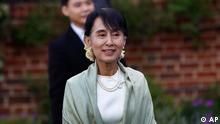 Aung San Suu Kyi refers to her country as Burma
What's in a name?
Aung San Suu Kyi refers to her country as Burma
What's in a name?
The name of Burma's then capital, Rangoon, also became Myanmar's center of power, Yanyon - later usurped by a new capital, Naypyidaw, built at the behest of the generals.
However, Aung San Suu Kyi's National League for Democracy has taken exception to the renaming, saying that the regime had no mandate to make such a change.
"The dictatorship arbitrarily changed the name of the country and the democracy movement said they didn't have the right," director the Burma Campaign UK, Mark Farmaner, told DW.
"Personally, I am a little bemused by the amount of arguing that goes on about names when at the same time you have a country with such an appalling human rights record, but I have had people tell me that it really is important," said Farmaner, before adding that electoral authorities who criticized Suu Kyi did not have their priorities in order.
"The focus is all wrong. It should be cleaning up its own house and making sure that elections are free and fair, unlike the last two that took place there."
In his book, "Burma or Myanmar?: The Struggle for National Identity," Asia expert Lowell Dittmer from the University of California, Berkeley, explains that the "new" name Myanmar originates from a written, literary form.
Burma, on the other hand, was derived from the spoken form of the name in Bamar, the Burman ethnic language. It was adopted by the British during their colonial rule of the country between 1826 and 1948, and gained international usage. Burmese became the adjective for all the country's people, and is still widely used.
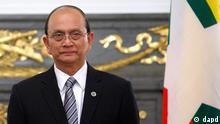 President Thein Sein's reforms have raised the question over the country's name once again
Dittmer defines countries that say Myanmar as "realists" who believe
names can be used to exert pressure - and nominalists, who do not.
President Thein Sein's reforms have raised the question over the country's name once again
Dittmer defines countries that say Myanmar as "realists" who believe
names can be used to exert pressure - and nominalists, who do not.
The argument runs that to use the name "Myanmar" is to sanction the denial of power to the country's opposition even after it won elections in 1990.
"Behind this apparently petty linguistic dispute, a battle has raged for national identity," said Dittmer.
"These two names have come to symbolize two quite different historical experiences and political trajectories, each upholding its claim to legitimacy."
Global confusion
Global leaders struggle with how to name the country, especially since reforms recently introduced by Prime Minister Thein Sein.
British Prime Minister David Cameron uses the name Burma, while recent speeches by US President Barack Obama also use the name.
But on a trip to the country late last year, US Secretary of State Hillary Clinton tended to dodge controversy by using the term "this country."
The name Burma continues to be used by many countries, including the United States, Canada and the United Kingdom. Meanwhile, the United Nations uses Myanmar, as do the Association of Southeast Asian Nations, China, Germany, India, Norway and Japan.
Brussels has found its own way to neatly sidestep the issue, calling the country Burma/Myanmar.
"Some countries within the EU call it Burma while others call it Myanmar," said EU spokeswoman Susanne Kiefer. "Although we have had that name for it for a while, it's something that has only recently been confirmed."
Burma Campaign UK's Farmaner maintains that an across-the-board change to Myanmar might be possible after more democratic reform is achieved.
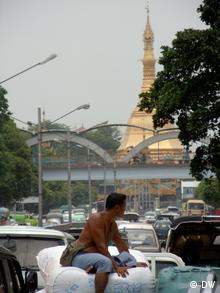 Less than 70 percent of people in the country are ethnic Burmans
"Maybe at a later date, a democratically elected government might also
change but the opposition is not going to accept it from a government
that seized power by the barrel of a gun."
Less than 70 percent of people in the country are ethnic Burmans
"Maybe at a later date, a democratically elected government might also
change but the opposition is not going to accept it from a government
that seized power by the barrel of a gun."
Setting priorities
It's a debate that likely to take something of a back seat for Suu Kyi, who returned home from her historic trip to Europe to cheering crowds on Saturday.
Balancing the need for economic development against the maintenance of external pressure on the government is likely pose a more immediate challenge.
With only a tiny fraction of seats for the National League For Democracy in a parliament dominated by the successor party to the pro-military junta, changing the naming of the country - or keeping it the same - looks to be a long way down the line.
Author: Richard Connor
Editor: Sarah Berning
"Daw Aung San Suu Kyi called Myanmar 'Burma' in her speech to the World Economic Forum in Thailand on 1 June, 2012," it noted. "Again, Daw Aung San Suu Kyi called Myanmar 'Burma' in her speeches during her Europe tour."
The military government changed the name in 1989 as European place names across the Asian continent became ever scarcer. Three years earlier, the UN had started to use Chinese - resulting in a change from the Romanized Peking to Beijing.
Myanmar - said to be an ancient term referring to the central part of the country - was chosen to ostensibly better reflect the diversity of the nation's population - of which ethnic Burmans represent less than 70 percent. Some experts say this is false, and that the two terms have been used interchangeably for centuries.
 Aung San Suu Kyi refers to her country as Burma
Aung San Suu Kyi refers to her country as Burma The name of Burma's then capital, Rangoon, also became Myanmar's center of power, Yanyon - later usurped by a new capital, Naypyidaw, built at the behest of the generals.
However, Aung San Suu Kyi's National League for Democracy has taken exception to the renaming, saying that the regime had no mandate to make such a change.
"The dictatorship arbitrarily changed the name of the country and the democracy movement said they didn't have the right," director the Burma Campaign UK, Mark Farmaner, told DW.
"Personally, I am a little bemused by the amount of arguing that goes on about names when at the same time you have a country with such an appalling human rights record, but I have had people tell me that it really is important," said Farmaner, before adding that electoral authorities who criticized Suu Kyi did not have their priorities in order.
"The focus is all wrong. It should be cleaning up its own house and making sure that elections are free and fair, unlike the last two that took place there."
In his book, "Burma or Myanmar?: The Struggle for National Identity," Asia expert Lowell Dittmer from the University of California, Berkeley, explains that the "new" name Myanmar originates from a written, literary form.
Burma, on the other hand, was derived from the spoken form of the name in Bamar, the Burman ethnic language. It was adopted by the British during their colonial rule of the country between 1826 and 1948, and gained international usage. Burmese became the adjective for all the country's people, and is still widely used.
 President Thein Sein's reforms have raised the question over the country's name once again
President Thein Sein's reforms have raised the question over the country's name once againThe argument runs that to use the name "Myanmar" is to sanction the denial of power to the country's opposition even after it won elections in 1990.
"Behind this apparently petty linguistic dispute, a battle has raged for national identity," said Dittmer.
"These two names have come to symbolize two quite different historical experiences and political trajectories, each upholding its claim to legitimacy."
Global confusion
Global leaders struggle with how to name the country, especially since reforms recently introduced by Prime Minister Thein Sein.
British Prime Minister David Cameron uses the name Burma, while recent speeches by US President Barack Obama also use the name.
But on a trip to the country late last year, US Secretary of State Hillary Clinton tended to dodge controversy by using the term "this country."
The name Burma continues to be used by many countries, including the United States, Canada and the United Kingdom. Meanwhile, the United Nations uses Myanmar, as do the Association of Southeast Asian Nations, China, Germany, India, Norway and Japan.
Brussels has found its own way to neatly sidestep the issue, calling the country Burma/Myanmar.
"Some countries within the EU call it Burma while others call it Myanmar," said EU spokeswoman Susanne Kiefer. "Although we have had that name for it for a while, it's something that has only recently been confirmed."
Burma Campaign UK's Farmaner maintains that an across-the-board change to Myanmar might be possible after more democratic reform is achieved.
 Less than 70 percent of people in the country are ethnic Burmans
Less than 70 percent of people in the country are ethnic BurmansSetting priorities
It's a debate that likely to take something of a back seat for Suu Kyi, who returned home from her historic trip to Europe to cheering crowds on Saturday.
Balancing the need for economic development against the maintenance of external pressure on the government is likely pose a more immediate challenge.
With only a tiny fraction of seats for the National League For Democracy in a parliament dominated by the successor party to the pro-military junta, changing the naming of the country - or keeping it the same - looks to be a long way down the line.
Author: Richard Connor
Editor: Sarah Berning
沒有留言:
張貼留言